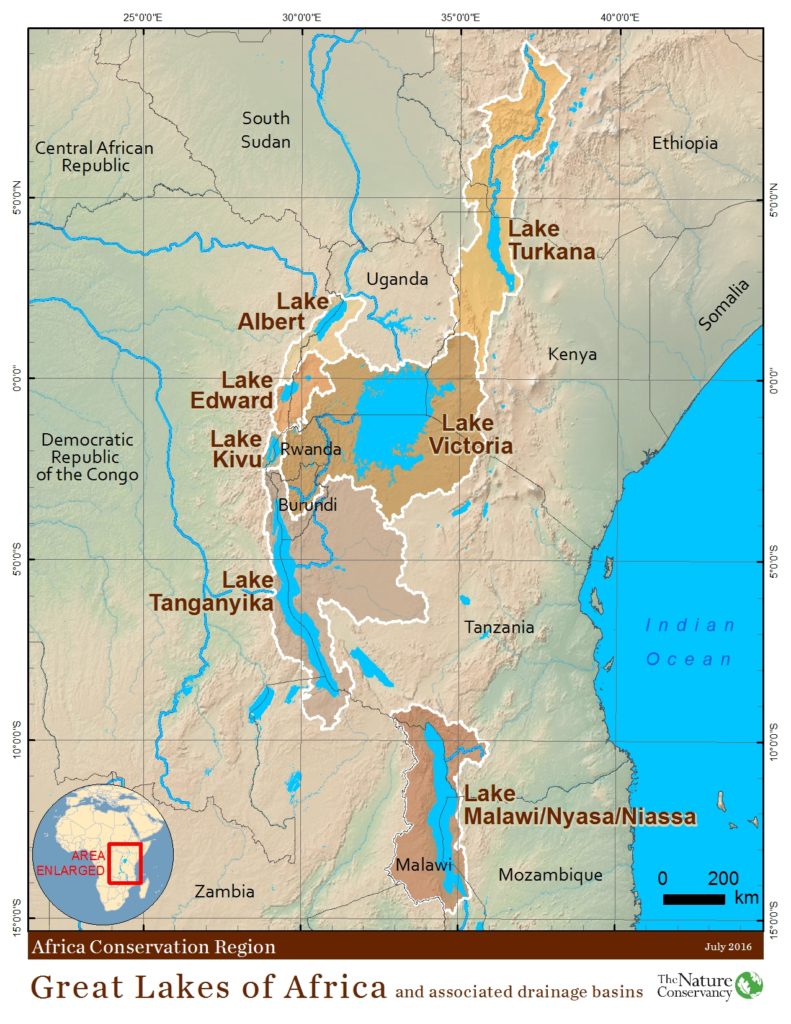 Each of the African Great Lake basins provides the critical water needed for humans—domestic, urban and industrial use, waste disposal, and reservoirs for hydropower generation and irrigation—all while acting to modulate local climate. In addition, the lakes are home to a vast array of fishes of economic and ecological importance, with capture fisheries that provide high quality protein and employment.
Each of the African Great Lake basins provides the critical water needed for humans—domestic, urban and industrial use, waste disposal, and reservoirs for hydropower generation and irrigation—all while acting to modulate local climate. In addition, the lakes are home to a vast array of fishes of economic and ecological importance, with capture fisheries that provide high quality protein and employment.
However, many of the lakes’ natural resources face threats from unsustainable fishing, invasive species, habitat degradation, urban and industrial pollution, and sedimentation caused by deforestation and agriculture. In addition, many of these pressures are on the rise due to some of the highest population growth rates in Africa, compounded by an increasing variability and change in climate that could threaten the water security and human well-being of much of sub-Saharan Africa.
While the African Great Lakes and their basins provide ample investment opportunities in aquaculture, agriculture, hydropower generation, fishing, transportation, urban and industrial development, recreation, mining, oil exploitation, and tourism—these values must be developed with a focus to sustain their service over the long-term, and to reduce negative impacts on human health and the environment. While development is critical, poorly planned and sited development could threaten the future of natural resources that have sustained the region for generations.
Each of the African Great Lakes vary in their biophysical and demographic characteristics, value and investment opportunities, ecological and economic concerns, governance systems, and potential sustainable development interventions.
Click to learn more about each of the African Great Lakes:
Because all of the African Great Lakes cross national borders, the benefits they offer and the challenges they face need to be managed at a basin-wide level. Several of the lake basins have formed regional institutions to coordinate management between nations that share a lake. Yet even those nations with policies and regulations to develop and conserve natural resources have sometimes struggled with unsustainable funding and a lack of capacity. A network of African Great Lake basin-wide institutions could serve to enhance coordination, strengthen capacity, share information and best practices, and improve the mobilization of resources. Sharing the best available science and best practices across basins is an opportunity to accelerate and expand the sustainable conservation and management of the African Great Lakes region.

 Each of the African Great Lake basins provides the critical water needed for humans—domestic, urban and industrial use, waste disposal, and reservoirs for hydropower generation and irrigation—all while acting to modulate local climate. In addition, the lakes are home to a vast array of fishes of economic and ecological importance, with capture fisheries that provide high quality protein and employment.
Each of the African Great Lake basins provides the critical water needed for humans—domestic, urban and industrial use, waste disposal, and reservoirs for hydropower generation and irrigation—all while acting to modulate local climate. In addition, the lakes are home to a vast array of fishes of economic and ecological importance, with capture fisheries that provide high quality protein and employment. 